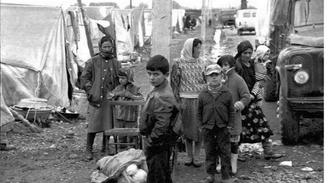Speaking at a conference in Yerevan, Armenia, on 4 July, Aureli Grigoriu alleged that on 26 February, 1992, Armenian forces, backed-up by Soviet troops, attacked 7,000 residents of Khojaly in the disputed territory of Nagorno-Karabakh, resulting in the deaths of 613 residents.
She also said that Armenia currently occupies 20% of Azerbaijan territory.
Grigoriu was subsequently barricaded in her hotel room and prevented from leaving the country.
At a press conference on 8 July, she said that the thrust of her speech at the conference, on European standards of supremacy of law and limits of discretion of authorities in Council of Europe member states, and organised by the Armenian constitutional court, did not single out Armenia, and could equally apply to other countries in the region, such as Georgia, itself involved in an international dispute over South Ossetia and Abkhazia or Transnistria. The focus of her speech, she said, was the protection and observance of human rights on the territories of frozen conflicts.
“In my speech, I was referring not only to Armenia, but also to Georgia and Moldova. Ombudspersons are not political players; they are human rights defenders who present their conclusions as regards the promotion and protection of human rights,” she said on 8 July.
Despite the outrage caused by her comments in Armenia, she said that the information she presented “was nothing new,” and was based on facts gathered in a UN resolution.
“I only wanted to draw the public attention to the violation of human rights in conflict zones. In my speech, I tackled the human rights issues not only in Nagorno-Karabakh, but also in Georgia and Transnistria,” she said, adding that the media had taken her comments out of context.
She said she had not meant to cause offence to anyone in Armenia, and denied that she was “working in the interests” of the Azerbaijan government.
The Azeri government has come to her defence. In a statement issued on 8 July, the commissioner for human rights, Elmira Suleymnova said that by facing “threats, accusations and insults,” and by being prevented from leaving the country, the rights of Aureli Grigoriu were “seriously violated.”
“The case when a person who is engaged in protection of human rights, particularly an official representative of a foreign state is facing threats and violation of rights for sounding the historic facts and truth acknowledged by the world community and international organizations, that in a parliament in a civilized country is commonly accepted as a free thought square, once again proved that Armenia is not a legal and democratic state,” read the statement.
“As the Commissioner for Human Rights of the Republic of Azerbaijan I strongly condemn these serious violations of the rights of my Moldovian colleague in Armenia and call on all of the international organizations as well as my foreign colleagues not to remain indifferent to these unacceptable events in Armenia against the Ombudsman of Moldova and to express their concern in this regard.”
NEWEUROPE
More about:
















































